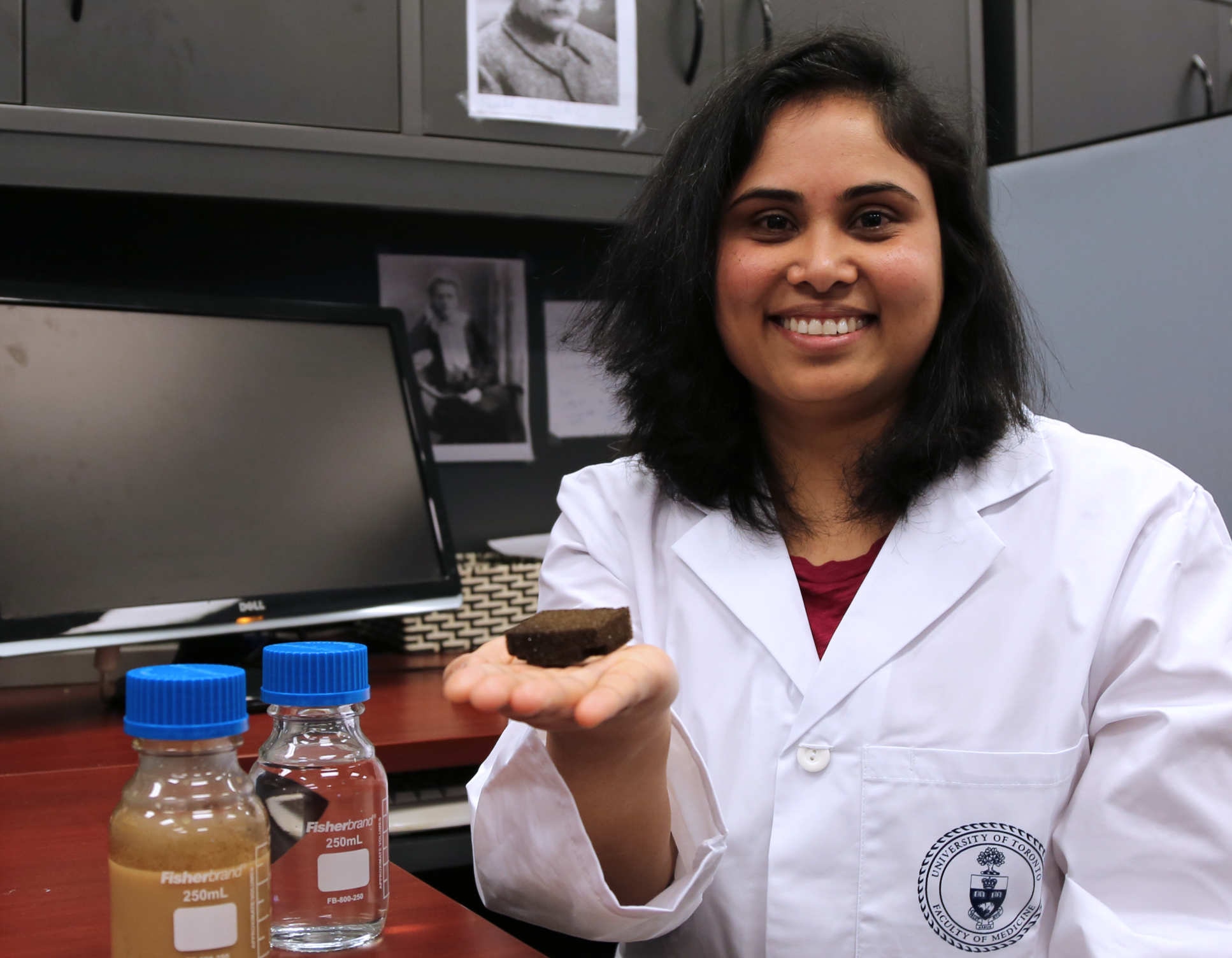Dec 17 2019
Every year, 100 billion barrels of wastewater contaminated with oil are produced by drilling and fracking processes that are carried out under the seabed to recover oil. These processes release small droplets of oil into the surrounding water.
 Dr Pavani Cherukupally with the sponge in her lab at the University of Toronto. Image Credit: Imperial College London.
Dr Pavani Cherukupally with the sponge in her lab at the University of Toronto. Image Credit: Imperial College London.
Although efforts have been made to remove oil from water, these mostly focused on removing huge oil slicks from industrial spills and hence are not appropriate for removing tiny droplets. Therefore, researchers are exploring new ways to decontaminate the water.
At the Imperial College London and the University of Toronto (U of T), scientists have now created an innovative sponge that is capable of removing more than 90% of oil microdroplets from wastewater within 10 minutes.
When the sponge is utilized, its surfaces are coated with a thin layer of oil through a process known as adsorption. After the sponge is used, it can be treated with a solvent, which, in turn, discharges the oil from the sponge. This oil can be subsequently recycled and the sponge can be used again immediately.
The new sponge is an improvement of an earlier concept: Dr Pavani Cherukupally, lead author and currently at the Department of Chemical Engineering of Imperial College London, had produced a previous version of the sponge while she was doing her PhD at the U of T.
While the earlier version of the sponge was able to remove over 95% of the oil in the tested samples, it took three hours to achieve this, which is relatively longer than would be viable in the industry. Moreover, the sponge can work only within a particular pH range.
Now, along with Imperial College London and U of T academics, Dr Cherukupally has chemically altered the sponge to make it useful for the industry. The novel sponge not only works faster, but also works over a relatively wider pH range when compared to the earlier version. The results of the study have been published in the Nature Sustainability journal.
Spongy Secrets
To develop the original sponge, Dr Cherukupally utilized normal polyurethane foams—just like those seen in couch cushions—to isolate small oil droplets from wastewater. The researchers then meticulously adjusted the surface area, surface chemistry, and pore size to produce a sponge that both attracts and captures droplets of oil while allowing water to pass through.
To further enhance the properties of the sponge in the latest work, the research team of Dr Cherukupally worked with chemists from U of T to add small particles of a material called nanocrystalline silicon to the surfaces of the foam.
This implied that the surface chemistry and surface area of the sponge could be controlled in a much better way. This can subsequently enhance the sponge’s potential to capture and retain the droplets of oil as a coating on the surfaces of pores—a concept referred to as critical surface energy. Once the sponge is used, it can be removed from the water and used again.
The critical surface energy concept comes from biofouling research, which tries to prevent microorganisms and creatures like barnacles from attaching to surfaces like ship hulls. Normally, you want to keep critical surface energy in a certain range to prevent attachment, but in our case, we manipulated it to get droplets to cling on tight.
Dr Pavani Cherukupally, Department of Chemical Engineering, Imperial College London
Cherukupally continued, “It’s all about strategically selecting the characteristics of the pores and their surfaces. Commercial sponges already have tiny pores to capture tiny droplets: Polyurethane sponges are made from petrochemicals, so they have already had chemical groups which make them good at capturing droplets.”
The problem was that we had fewer chemical groups than what was needed to capture all the droplets. I therefore worked with U of T chemists to increase the number of chemical groups, and with Imperial’s Professor Daryl Williams to get the right amount of coating.
Dr Pavani Cherukupally, Department of Chemical Engineering, Imperial College London
Oil Cleanup
Current strategies for oil spill cleanup are focused on the floating oil slick, but they miss the microdroplets that form in the water. Though our sponge was designed for industrial wastewater, adapting it for freshwater or marine conditions could help reduce environmental contamination from future spills.
Amy Bilton, Study Co-Author and Professor, University of Toronto
Dr Cherukupally will strive to enhance the performance of the sponge for oil applications, and has collaborated with Dr Huw Williams at the Department of Life Sciences of Imperial College London to analyze how bacteria can be removed from saltwater using sponges.
Dr Cherukupally also intends to utilize the sponges to treat contamination from the textile, mining, and gas sectors, and is planning to make the technology cost-effective so that it can be used in developing countries, to remove pathogens, heavy metals, and organics from contaminated rivers.
The study was financially supported by Natural Sciences and Engineering Research Council of Canada, Consortium of Cellular and Microcellular Plastics and Natural Resources Canada Oil Spill Response, Department of Fisheries and Oceans, Engineering and Physical Sciences Research Council UK, and National Natural Science Foundation of China.
Inside a new oil-catching sponge
An oil-catching sponge, developed at the University of Toronto and Imperial, could help thwart water contamination from offshore oil drilling. Video Credit: Pavani Cherukupally, Saurabh Shah, Imperial College London.
Source: https://www.imperial.ac.uk/